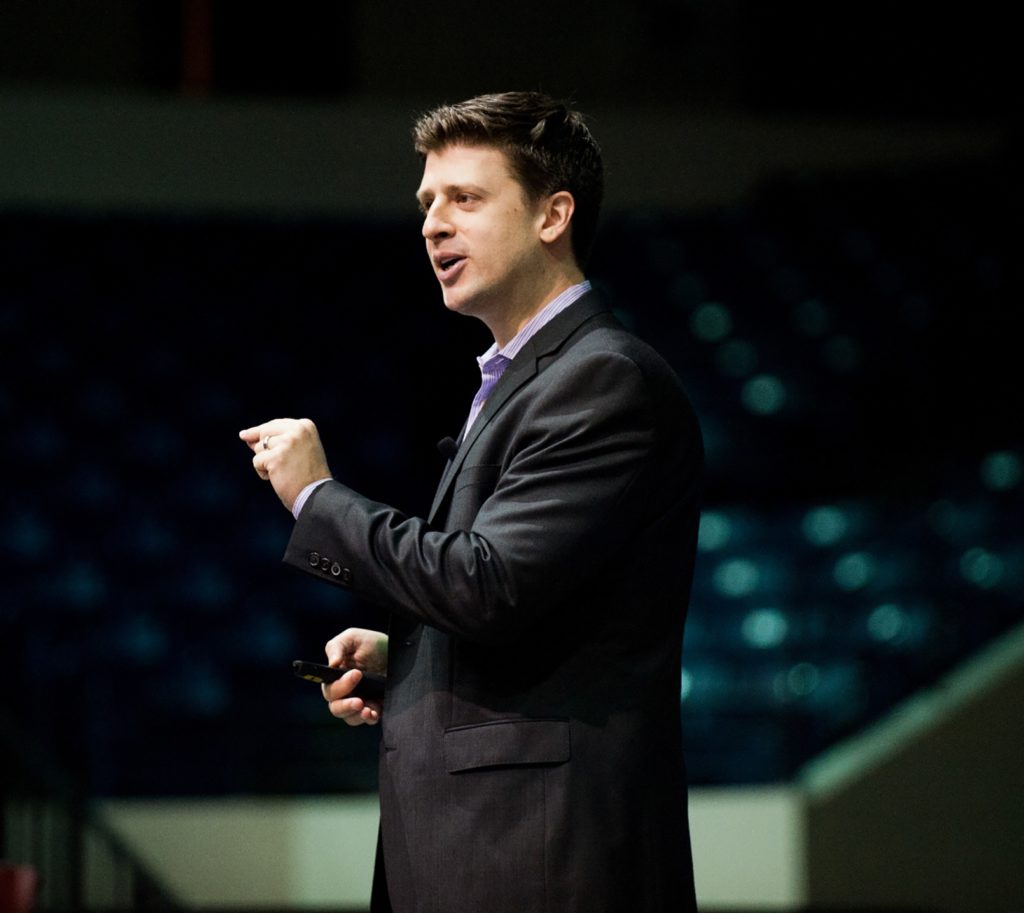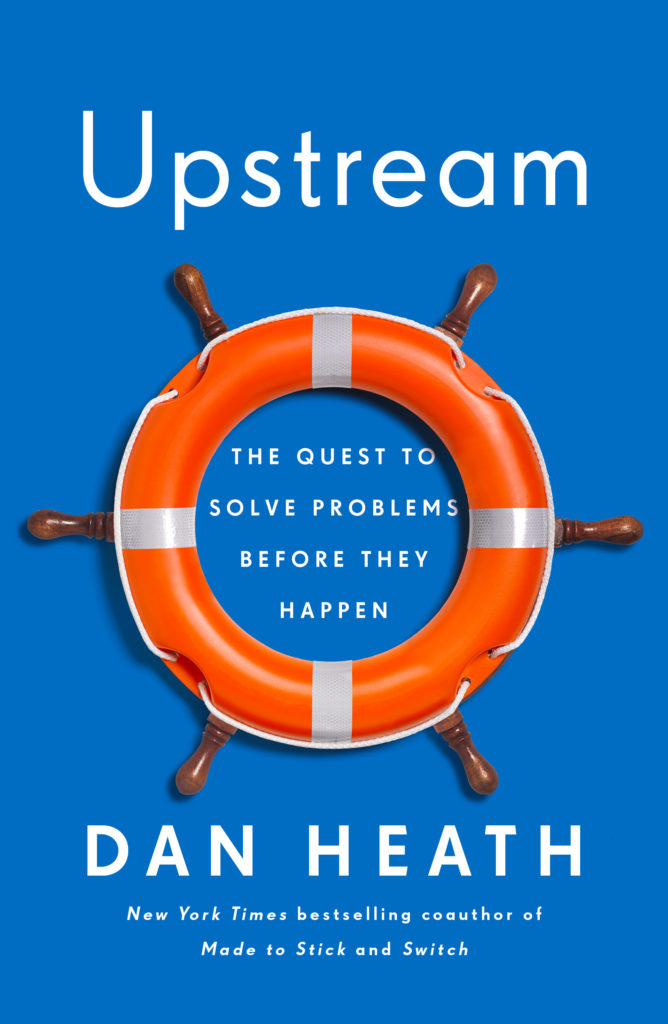By Gail Picco (January 28, 2020)
Upstream: The Quest to Solve Problems Before They Happen by Dan Heath, Avid Reader Press, March 3, 2020, 320 pp., $36.97
In my line of work, as a fundraiser and charity strategist, I spend a fair amount of time planning how to respond when things go wrong or when objections are raised. Because as campaign-tested professionals know, it’s not a matter of if, but when.
As a result, this upcoming book by Dan Heath caught my eye. Dan is one half of the Heath brothers who, with brother Chip, is a proponent of social entrepreneurship. Together, they have written four best-selling books, the most recent of which was Made to Stick: Why Some Ideas Survive and Others Die. Made to Stick was given to me by my former boss. It was a decent read about the necessity of understanding your message and honing it down to one bite-sized chunk, particularly in the non-profit world. Not necessarily an original idea, but undeniably one worth repeating.
The book jacket copy of Made to Stick quoted Mark Twain as once observing, “A lie can get halfway around the world before the truth can even get its boots on.”
Unfortunately for the Heath brothers, it was not Mark Twain who made that observation. The irony, in this instance, was that the quote is attributed to 18th century writer, satirist and clergyman Jonathan Swift who penned Gulliver’s Travels, which I think we can agree, was a rather pessimistic accounting of human potential.
But never mind that. Perhaps the experience inspired Heath’s latest work Upstream: The Quest to Solve Problems Before They Happen.
The title Upstream is taken from the story of infants being rescued from drowning in a river without people checking on why they ended up in the river in the first place. It is a story I used in the Preface of my own book Cap in Hand in 2017 to illustrate the need for addressing systemic issues as opposed to reacting to emergencies. Needless to say, I am simpatico with Mr. Heath’s offering, however jarring it was to read a preface so closely mirroring my own, written three years ago.
But never mind that. It’s hard to have an original idea these days. With this book, Heath wants to convince us we “should shift more of our energies ‘upstream’: personally, organizationally, nationally, and globally. We can—and we should—stop dealing with the symptoms of problems, again and again, and start fixing them.”
Heath uses the example of assisting pregnant women as being one way of lowering youth crime rate:
“Think of it: [Psychologist Richard]Tremblay is proposing to improve a pregnant mother’s environment so dramatically that she’ll be prone to fewer risk factors (poverty, anger, depression), which means that her child will be less prone to aggressive tendencies, which could in turn lead to a reduced risk of criminal activity. Maybe 18 years later, the woman’s child will end up going to college instead of breaking into a house.”
Seemingly unaware of social movements the world over trying to deal with income inequality, institutionalized racism and poverty, he identifies a number one issue about solving problems before they start as “Problem Blindness.”
“Problem blindness is the first of three barriers to upstream thinking that we’ll study in this section. When we don’t see a problem, we can’t solve it.”
He cities examples of NFL training programs, Chicago public school graduation rates and high rates of Caesarian sections in Brazil as examples.
The second barrier to “upstream” work, according to Heath, is a “lack of ownership,” people who recognize the problem but believe “that’s not mine to fix.” He uses a pesky lifestyle problem of a wife leaving the hall light on, which annoyed her husband, who ultimately decided to take “ownership” of the issue and install a timer for the hall light. Problem solved by upstream thinking.
The third leg of the upstream stool involves “tunnelling,” which Heath tells us is a concept developed by psychologists Eldar Shafir and Sendhil Mullainathan in their book Scarcity, which articulates a notion where “people are juggling a lot of problems, they give up trying to solve them all. They adopt tunnel vision. There’s no long-term planning; there’s no strategic prioritization of issues.”
Tunnelling is doing the thing that needs addressing in any given moment.
Heath says,
“Saving the day feels awfully good, and heroism is addictive. We all have colleagues who actually seem to relish those manic “stay up all night to meet the critical deadline” adventures. And it’s not that the day doesn’t need saving, sometimes, but we should be wary of this cycle of behavior. The need for heroism is usually evidence of systems failure.”
How do you solve tunnelling, asks Heath? You do it by creating “slack.” In this context, he says slack, “means a reserve of time or resources that can be spent on problem solving.”
He quotes Harvard psychologist Daniel Gilbert, who argues that a focus on the immediate and the urgent is a default feature of our thinking, to respond to “to clear and present danger” and argues that we have to make upstream thinking downstream.
“The first thing to realize is that “creating urgency” is basically coopting the power of tunnelling for good” and cites international action on the ozone layer as an example.
One of the remarkable things about Upstream is how it breaks down the array of world problems and attributes them all to program blindness, lack of ownership and tunnelling. He, very appropriately, wants to create a sense of urgency about complex problems, yet he doesn’t identify as a problem human rights, the equity gap, or structural change. That is not to say Heath doesn’t talk about problems that result from the poverty gap or racism. He asks, “can we prevent homelessness by interrupting evictions,” but doesn’t get as far as asking the question about why evictions. He just doesn’t go that far upstream.
In a discussion of gun violence among youth in Chicago, Heath tells the story of University of Chicago public policy professor, Harold Pollack, who is working in the university Crime Lab and tasked with bringing options to policy makers.
“’We’re the University of Chicago, so we have to have equations,” [Pollack] said. “My fundamental equation is a couple of young guys plus impulsivity, maybe plus alcohol, plus a gun, equals a dead body.’”
“All of those are potential leverage points: moderating impulsivity or reducing alcohol consumption or restricting access to guns,” writes Heath. “The next question becomes: Can you identify an intervention that could plausibly accomplish one of those goals?
António Guterres, Secretary General of the United Nations, is a man charged more than any other in the world with thinking “upstream.”
In his New Year remarks to the UN General Assembly on January 22, 2020, he referred to the “four horsemen” of the Apocalypse.
These four horsemen (who appear in the book of Revelations and mark the end of days) are a metaphor for what he sees as the problems facing the world– epic geopolitical tensions, the climate crisis, global mistrust and the downsides of technology. And they can jeopardize every aspect of our shared future, says Guterres.
He says we must improve governance, tackle illicit financial flows, stamp out corruption and develop effective, common sense and fair taxation systems; build economies for the future and ensure decent work for all, especially young people; rethink economic, political and social systems from an equality perspective. And we must put a special focus on women and girls because it benefits us all. In this writer’s view, that’s the definition of upstream thinking.
Heath’s book is entertaining. He interviewed more than 300 people for the book and he is a good storyteller, using his abilities to tell many stories about people solving problems from home lighting to mitigating high school drop-out rates. And the tips provided in some of his smaller-scale examples will definitely appeal to many readers.
When it comes to making the world a better place, the river is wide, and as Jimmy Cliff sang, there are many rivers to cross. So you might think, especially those of us working in the charity sector, there are different ways of preventing problems, Some go further upstream than others. Ideally, we want to have people staked out all along the river bank.
But thought leaders like Heath don’t usually go far enough upstream to talk about structural change. Because things are messy that far up the river and the book’s proposed solutions—creating leverage, uniting the right people, getting early warning of the problem and knowing when you succeed— are all good things to consider, but don’t address structural change. And thought leaders need formulas that, when followed, will produce a happy ending. But structural change is a tougher nut to crack, solutions are not easy.
In his book, Winners Take All: The Elite Charade of Changing the World, Anand Giridharadas writes about a whole industry of “thought leaders” who attend Ted talks, conferences and “idea festivals” on world problems who are willing to confine their thinking to “improving lives within the faulty system rather than tackling the faults” and how these thought leaders have replaced “critics” who are looking at system-wide problems that need multi-layered, politically-based solutions. In the marketplace of ideas, these “critics” are often perceived as grumpy polemicists.

Dan Heath fits squarely into this industry of thought leaders. It is a positive development to be looking at the circumstances that cause problems and given Heath’s ability to be able to sell books, we’ll probably see Ted talks and conference seminars about upstream thinking. You’ll be well justified in asking how far upstream are we prepared to go.
(Gail Picco is a fundraiser, charity impact strategist and author. She edits the CSP Book Blog.)
